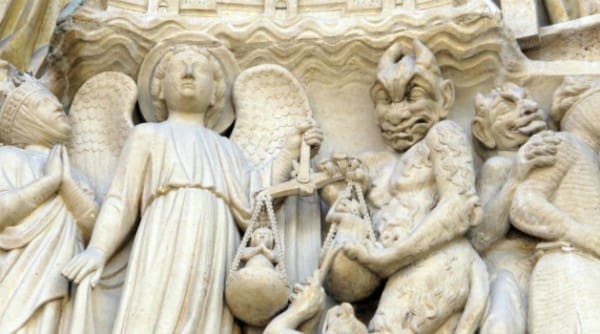An Exorcist Explains Demonic Possession and Vexation

Without a doubt, diabolical possession, the invincible influence of the devil on a person, is the most striking and serious form of the extraordinary action of the devil. When the demon is able to take possession of a person, he can make him say and do what he wishes.
It is necessary to clarify that the devil is not able to take possession of the soul of a man (unless the person expressly consents to it), but only his body. Nevertheless, I must say that the cases of valid and true possession are rare: cases of vexation, obsession, and infestation are more frequent.
Manifestation
When possession is manifested, the obsessed goes into a trance and loses consciousness, leaving space for the evil spirit to speak; to agitate the person; to curse — in brief, to take over. On this subject Father Candido told me of the case of a young girl, an extremely thin and apparently weak demoniac who, during the exorcisms, had to be tied with leather straps and held firm, with difficulty, by four very energetic men. Well, she managed to break the straps with which they attempted to tie her, causing them much trouble until the end of the rite.
It also happened to me: a decade ago, a very thin young girl — she could not have been more than thirteen years old — accompanied by her mother and her mother’s friends, received incredible strength from the devil during an exorcism. It took all seven of my “guardian angels,” the persons who accompany me with prayer, to hold her firm.
During these crises, the manifestation of abnormal phenomena occurs at intervals, but not continuously. The subject will lose consciousness all of a sudden. But at other moments of the day, they will appear normal. The possession is seldom permanent.
More often the crises are provoked by external motives — for example, during a situation of spiritual stress, such as the exorcism itself, the Mass, benediction, prayer, or even the simple introduction of a sacred object. At other times, it goes off without apparent cause. The demon acts when, how, and where he wishes — during the day, at night, or even in a public situation, so that all can see. In these cases its will is acting through the spiritual power of its angelic nature. Nothing in these cases is ascribable to the victim of the possession.
I have noticed that each possession is unique; this is also true for the other forms of the devil’s extraordinary influence. There are liberations that occur in a few sessions and others that require many years of exorcisms. Some have obvious and coarse manifestations, and others — such as the case of a mute spirit — do not ever pronounce a word. These last are among the most difficult cases to treat.
Who Becomes Possessed?
Who becomes possessed? No one can consider themselves excluded: they can be young or old, believers or atheists, Christians or those of other religions. Through the years there have been Muslims who have had serious cases of possession. Not even consecrated religious are ruled out: I recall the case of Sister Angela, who was obsessed with a cursing that resounded in her mind. In most cases, those who are distant from the Faith are more susceptible to this risk, but this is only an indication of the maxim that says the devil is more tranquil if he does not have to live with prayer, fasting, the Eucharist, and the other sacramental practices.
The devil is content when no one believes in his existence or when people consider him solely a medieval relic: then he is truly able to act tranquilly!
Temptation is conquered by vigilance, avoiding sin, and praying, because without the help of God we are not capable of conquering the seduction of sin. No one is exempt from temptation; some of the saints have had tremendous temptations even on their deathbeds. From their testimonies, we understand that as long as we have breath, we shall never be free of temptation.
Multiple Possessions
It is useful to know that there are also multiple possessions; many spirits can be seen acting in a person contemporaneously. There was, for example, the case of Joanne, a woman of thirty, married with children. She fainted often and had severe headaches without apparent medical causes. In the course of various encounters, it was revealed that she was possessed by three demons who had entered through three spells, one of which was from a woman who aspired to have Joanne’s fiancé before Joanne married him. The first two exited quickly and the third with more difficulty, but in the end we made it. It was a family of faith; for this reason, I believe, liberating Joanne was relatively simple.
There are cases, as in the Gospel of Mark, when Jesus was found with the demoniac possessed by a legion of devils (see Mark 5:1–20). This term, typical of the Roman military organization, suggests a reality that we exorcists often confront. When the possession is multiple, it has to do with spirits that are organized hierarchically, precisely like a military body: there are chiefs, deputy chiefs, and simple soldiers. Each one is provided with a different authority.
Little by little, as the exorcism proceeds, the spirits with the least authority, the weaker spirits, abandon the field. The victory, the complete liberation, is accomplished after the defeat of the supreme head of the legion, the most powerful and overbearing, the last to leave the ship, the one of whom the other demons have a true and proper terror.
Discerning Possession
How does one discover that he is possessed? There are persons who discover they are possessed when frequenting a sacred place, perhaps a Marian sanctuary, or when they participate in retreats, processions, prayer encounters, or Eucharistic adoration. They may have had some disturbance in the past to which they didn’t pay much attention, but then on those occasions it manifested itself in a clearer and more obvious way.
It is the sign that the devil has remained hidden as long as he was able (he can hide himself for long periods, dissimulating his presence), but when confronting the power of God he must manifest himself. This fact, contrary to what one may think, must be accepted as a grace, because only in knowing the illness can one intervene.
At times, as mentioned in the case of Joanne, there are physical problems that medical doctors cannot explain, and then a bell goes off. It was like this for Marcella, a girl of nineteen who suffered from a stomach ailment and could not sleep, and who would give sharp answers at home and at work. As soon as I touched her, lifting her eyelids, her eyes were entirely white and the pupils reverted toward the back. I did not even have time to think when an evil sneer said to me: “I am Satan.” We were able to liberate her in two years, but she is still much engaged in prayer.
Contagious?
I wish to stress that neither possessions nor evil spells are contagious. In other words, there is no risk of being struck by coming in visual, auditory, or tactical contact with demoniac persons. A demoniac can also marry and have children without danger of infecting her family. I say this, above all, to benefit the relatives and friends who may be asked to involve themselves in these difficulties and to stay close to these suffering persons with a prayerful and understanding attitude. At times, living with such people is very difficult and truly tests a person. This is even truer for the priest.
We have already revealed that the more we fear the devil, the more he attacks us. Therefore, if we leave him alone he will become aware of our weakness and will never leave us in peace.
It is therefore true that persons who have had an experience with possession and then resolved it acquire a great sensibility toward situations in which a satanic presence is evident.
Diabolical Vexation
Diabolical vexations are the second type of the demon’s extraordinary spiritual aggression and are far and away the most numerous. They are caused by a person’s cultivation of imprudent habits; by frequenting wizards or séances, through repeated and persistent serious sins, or by submitting to spells.
Here the devil acts without any dominant and prevailing influence over the body and the mind of the victim, as happens in the case of possession. Vexations are true and actual aggression, physical or psychological attacks that the demon works against a person. At times they result in scratches, burns, bruises, or, in the most serious cases, broken bones. At times the victim is the target of stones or other objects.
Typical cases of vexation are illnesses without any apparent cause that affect the internal organs or the limbs or pathologies that provoke pain in a part of the body without visible signs. Vexations can involve health, affections, or work.
Often the vexation is associated with an extraordinary evil spell, in the sense that the person possessed or obsessed can also exhibit physical and psychic disturbances. It happened to me that in liberating a demoniac, the woman was contemporaneously cured of a terrible tumor. Evidently, in this case, the spell submitted to by the demon had a duplicate effect, spiritual and physical. On the other hand, the Gospel also attests to cases of physical healing that are tied to a spiritual healing from an evil spell. For example, Jesus heals a mute demoniac (see Matt. 9:32–34) and a blind and mute demoniac (Matt. 12:22–24).
Vexations can also involve an oneiric dimension: while sleeping, a person may have terrible nightmares, in which he dreams of cursing, of damning God, or of becoming perverse and wicked. In this case, we are at the borders of diabolical obsession.
We can give some examples from the lives of the saints: St. Pio, for example, was whipped by a demon. The Curé of Ars was often thrown out of his bed by Satan. I would say that these cases concerned diabolical vexations, not possessions.
As I have said, vexations are not always manifested on a physical level. Sometimes they can strike affections: it can happen, for example, that a couple who are married or are engaged to be married can separate, or, to the contrary, two persons can become engaged, even though they are incompatible.
Other vexations are manifested in work: the person in search of it does not find it; or the person who finds work loses it; or a person may have gross difficulties with colleagues and bosses at work. Other times, vexations can break up friendships and isolate a person. It is impossible to enumerate all the cases.
Illness or Vexation?
How does one distinguish between a physical illness and a diabolical vexation? It is necessary, as always, to be very prudent in evaluating symptoms.
People who are easily impressionable can become upset without foundation. Often, in fact, an illness or psychological discomfort is natural and can be easily diagnosed by a medical or psychiatric specialist. But anyone who notices the presence of tormenting phenomena tied to an inexplicable aversion to the sacred, to God, or to prayer should seek spiritual discernment.
Likewise, having frequented occult practices in the past or contacted wizards, mediums, or fortune-tellers, even in good faith, or having been subjected to spells can be valid indications for the need for good discernment.
+
This article is adapted from a chapter in An Exorcist Explains the Demonic by Fr. Gabriele Amorth which is available from Sophia Institute Press.
Art for this post on forgiveness demonic possession and vexation: Cover used with permission; Image of Relief of St. Michael vs. the devil at Notre Dame Cathedral in Paris: Photography used with permission of Pixabay.
To read more about the devil and exorcisms, click HERE.




